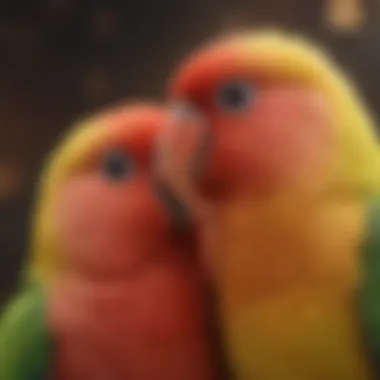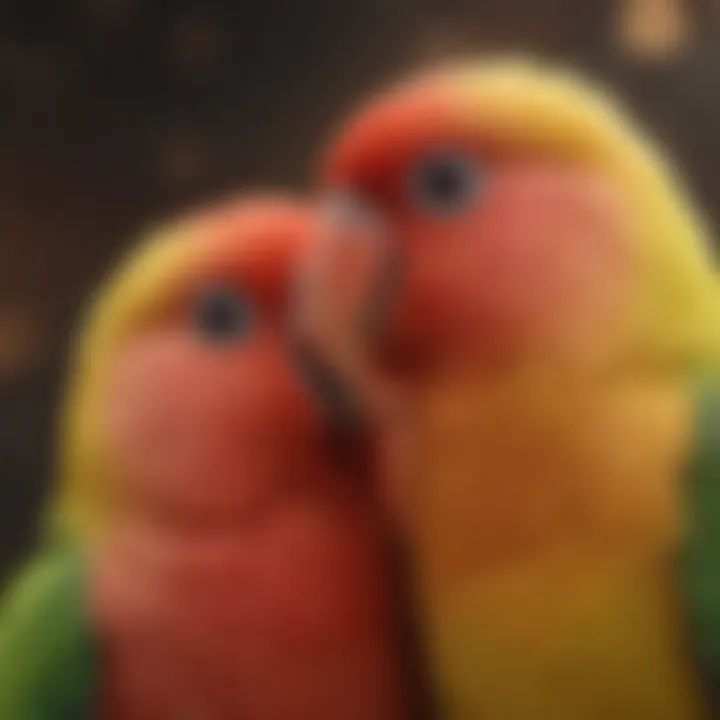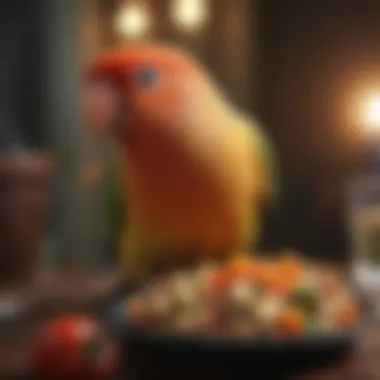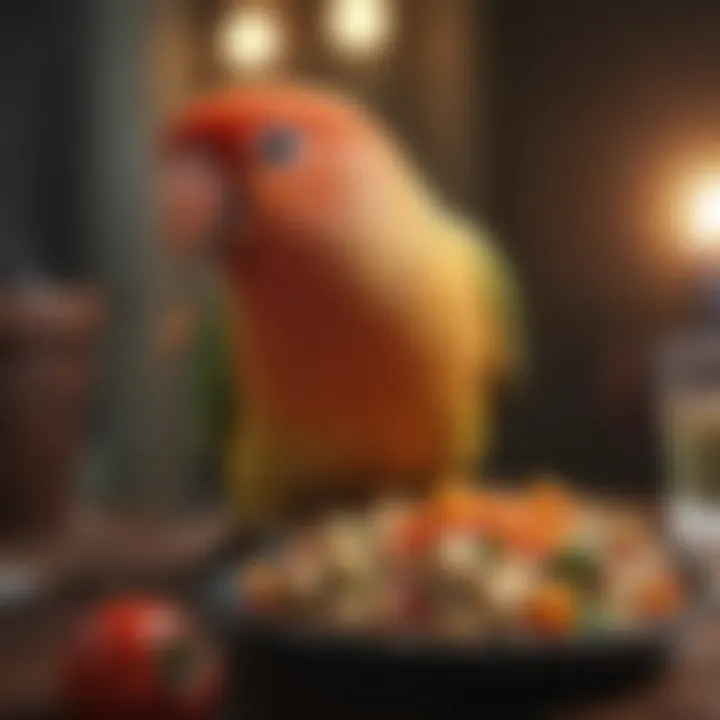Essential Vitamins for Lovebird Health and Nutrition


Intro
Lovebirds, with their vibrant colors and lively personalities, require special care to flourish. Understanding the right vitamins for their health is crucial. This guide will dissect the role of essential vitamins in the diet of lovebirds, how these nutrients help maintain their overall well-being, and how to ensure they're getting what they need. Let’s dive into how nutrition impacts these charming creatures' lives, from immunological functions to longevity.
Avian Care Basics
Importance of Proper Nutrition
Proper nutrition stands like a solid foundation in the world of pet care. Without it, even the most coddled lovebird can succumb to health issues. These birds thrive on a balanced diet that includes seeds, fruits, and vegetables, all enriched with the right vitamins. Not just about filling their bellies, it’s about nurturing their growth, energy levels, and immunity.
Understanding Bird Species and Their Needs
Each bird species is like a puzzle piece with unique requirements. Lovebirds, for instance, tend to enjoy a diversity of foods but need specific vitamins to thrive. They often hinge on a few key vitamins such as A, D, E, and B-complex. Tailoring their diet with these in mind can mean the difference between a peppy feathered friend and a bird that’s sluggish.
Basics of Birds Habitat Setup
A suitable habitat is another part of the equation. An environment that mirrors a lovebird's natural habitat can greatly enhance their health. Think about providing safe chew toys or perches. And it's important, these spaces should be well-ventilated, cleaned regularly, and should feature areas for climbing and exploration. This setup contributes to their mental and physical stimulation, which eventually ties back into their nutritional health.
Grooming and Hygiene Tips
A lovebird's feathers and skin demand attention too. Regular grooming minimizes health risks like bacterial infections. Bathing them once a week helps, and offering cuttlefish bone can keep their beaks in check. Always keep an eye on their droppings; changes could signal a dietary deficiency or health issue, revealing much about their current state.
Interacting with Your Pet Bird
Building Trust and Connection
Forming a bond with your lovebird goes a long way. Interaction can start slowly, just speaking gently, followed by offerings of their favorite treats. Building trust is key — let them feel safe around you and, before long, you’ll have a more sociable feathered companion.
Training Techniques and Tips
Training becomes a fun game rather than a chore. Start with simple commands; for example,, teaching them to step up onto your finger is a great start. Positive reinforcement, like treats, helps them learn faster, making a happy environment for both sides.
Fun Activities for Bird Owners and Their Birds
Engaging with your lovebird through play can foster both connection and excitement. Activities like puzzle toys or the occasional chase with a soft feather can stimulate their minds and encourage exercise. Both are imperative for their health and happiness.
Recognizing Bird Cues and Behaviors
Being attentive to your lovebird’s behavior allows you to respond to their needs better. If a bird is puffed up or lethargic, it might be feeling under the weather. Observing their body language helps you understand when they require more attention or health checks.
Emotional Well-Being of Birds
The Role of Play and Socialization
Play isn’t merely a luxury; it’s a necessity. Lovebirds, being inherently social, require interaction either with their humans or other birds. Engaging them in playtime or letting them socialize can prevent behavioral issues and promote emotional health.
Enhancing Birds' Emotional Health
A stressed bird may show signs like excessive preening or vocalization. You may alleviate stress factors by keeping their environment calm and predictable. A companion bird can also ease feelings of loneliness, creating a more joyful atmosphere.
Assessing Bird Stress and Remedies
Learn to spot stress indicators: fluffed feathers, aggression, or retreating to a corner. Remedies can include quiet time, toys, or even calming music. It all depends on reading your lovebird's cues and adapting the environment.
Building Strong Human-Bird Bonds
Developing a strong bond fosters trust, and it has a direct influence on their willingness to interact. Spending time interacting without overwhelming them lays the foundations of an enriching relationship.
Bird Health and Safety
Common Health Issues and Prevention
Health issues often creep up when least expected. Common ailments include feather plucking or respiratory infections. Regular monitoring can help catch these early. Ensuring they can exercise and giving them a varied diet reduces the chance of many ailments.
Routine Veterinary Care
Never underestimate the importance of regular check-ups. Finding an avian vet well-versed in lovebird care ensures that your feathered friend receives the right preventive care, vaccinations, and treatments.
Environmental Hazards to Avoid
Birds are sensitive to their environments. Toxic plants, fumes from cooking, or even exposure to extreme temperatures can pose dangers. As a pet owner, it’s your responsibility to safeguard their surroundings against these risks.


Signs of Illness or Distress
Knowledge of the signs of distress can save a lovebird’s life. Watch for changes in eating habits, vocalization, or behaviors. These changes, although subtle, can signal an underlying health crisis.
Fun Facts and Quirky Insights
Unique Traits of Popular Bird Species
Did you know that lovebirds are incredibly affectionate and enjoy cuddling? They are known for forming strong pair bonds, often preening each other as a sign of affection. Their colorful plumage isn't just for show; it also makes them stand out in their native habitats.
Historical and Cultural Significance of Birds
Birds have long been a symbol of freedom and beauty across various cultures. They appear in myths and traditions, representing everything from joy to sorrow. Understanding this deep connection adds layers to the joy they bring as companions.
Famous Bird Owners and Their Stories
Numerous celebrities have adored their pet birds, from actors to musicians, showcasing lovebirds like badges of honor. Their experiences may inspire the rest of us to embrace these feathered friends
Intro to Lovebird Nutrition
Nutrition is the backbone of any creature's health, and lovebirds are no exception. A proper understanding of lovebird nutrition is not just beneficial; it’s essential. It lays the groundwork for vibrant plumage, lively behavior, and a resilient immune system. This section highlights why lovebird nutrition is crucial, and it will help you make informed dietary choices that foster the overall well-being of these delightful birds.
The Importance of a Balanced Diet
A balanced diet is akin to a well-tuned orchestra; every instrument must play its part for harmony to be achieved. Lovebirds thrive on a varied diet consisting of seeds, vegetables, fruits, and occasional protein sources. This diversity not only provides necessary vitamins but also ensures that they receive a wide range of nutrients. If they munch on seeds alone, it’s like trying to fuel a car with water—eventually, something's gonna give!
Incorporating a mix of foods is vital for maintaining their health. Some key benefits of a balanced diet include:
- Enhanced Immune Function: Right nutrients help in warding off illnesses.
- Better Energy Levels: A diverse diet aids in keeping lovebirds active and playful.
- Improved Feather Quality: Nutrients support healthy plumage and coloring.
Without the right combination of foods, your feathered friends might face a uphill battle against health issues. They may become lethargic or more prone to infections, ultimately affecting their quality of life.
Overview of Vitamins and Their Functions
Vitamins play a significant role in the overall health of lovebirds, acting as the unsung heroes of avian nutrition. Lovebirds require certain vitamins for specific bodily functions, and without them, the clock is ticking on potential health issues.
Here's a snapshot of the major vitamins and their roles:
- Vitamin A: Crucial for vision and immune function. It helps lovebirds see the world clearly while keeping their defenses strong.
- Vitamin D: Vital for calcium absorption, which strengthens bones and keeps them healthy.
- Vitamin E: Acts as an antioxidant, combating oxidative stress and supporting reproductive health.
- Vitamin K: Essential for blood clotting, preventing excessive bleeding in these lively birds.
When you provide a diet rich in these vitamins, you're giving your lovebird a fighting chance against many potential health concerns. Creating an optimal diet isn’t just about filling their bowl; it's about thoughtful consideration of their needs. As you read on, you’ll discover how to provide these essential nutrients through both natural sources and supplements, ensuring a happy and thriving lovebird.
Key Vitamins for Lovebirds
When it comes to ensuring the health and vitality of lovebirds, understanding the role of key vitamins cannot be overlooked. Each vitamin serves specific functions that contribute to overall well-being, enhancing not just physical health but behavioral aspects too. Developing a deeper comprehension of these vitamins can help lovebird owners make informed dietary choices. The right balance of vitamins supports immune health, promotes good vision, and aids in calcium absorption, leading to longer, healthier lives for these charming birds.
Vitamin A: Enhancing Vision and Immune Health
Vitamin A is a powerhouse nutrient that plays a critical role in enhancing the vision of lovebirds. It supports night vision and ensures that birds can see well in low-light conditions. This factor is vital, as their natural environment can often present dimly lit areas. Furthermore, Vitamin A contributes significantly to immune function, acting as a defense mechanism against infections. Lack of this vitamin can lead to serious health issues, including respiratory infections.
Incorporating foods like dark leafy greens, carrots, and sweet potatoes could help in fulfilling their Vitamin A requirements. Some owners prefer to use a commercial diet that explicitly states it includes this essential vitamin, but fresh foods should always be on the menu.
Vitamin D: Critical for Calcium Absorption
Vitamin D goes hand in hand with calcium in supporting the skeletal system of lovebirds. Its primary function is to aid in the absorption of calcium from the diet, which is crucial for healthy bone development and maintenance. Birds deficient in Vitamin D may suffer from a range of skeletal issues, including weakened bones or deformities.
Sources for this vitamin often come from sunlight. It's vital for pet owners to make sure their lovebirds get enough sun exposure. Alternatively, specially formulated UV lamps for birds can help mimic the sun's rays indoors. Additionally, foods such as fish liver oil and certain types of mushrooms are good sources to consider.
Vitamin E: Antioxidant Properties
Vitamin E is often championed for its antioxidant properties, protecting cells from oxidative stress. For lovebirds, this means enhanced overall health and vitality. This vitamin also plays a role in maintaining healthy skin and feathers, giving lovebirds their vibrant look. A deficiency in Vitamin E can lead to problems like muscle weakness and issues with reproduction.
In practical terms, nuts, seeds, and leafy greens can boost Vitamin E in a lovebird's diet. Some owners might even opt for specific supplements that list Vitamin E as an ingredient. Just be mindful of the right dosages; more isn't always better with vitamins.
Vitamin K: Importance in Blood Clotting
When it comes to blood health, Vitamin K is the unsung hero. It is crucial in the clotting process, ensuring that any cuts or injurious incidents don't lead to serious blood loss. For lovebirds, maintaining adequate levels of Vitamin K can prevent health emergencies
Foods rich in this vitamin include kale, spinach, and broccoli. It's often recommended that pet owners incorporate a variety of these greens to ensure their lovebirds get the necessary intake. A balanced diet with ample sources of Vitamin K not only supports blood health but also adds nutritional diversity.
"The key to a vibrant, healthy lovebird lies in the nutrition provided by their owners, making understanding vitamins essential."
Using these insights can guide pet owners in crafting a nutrient-rich diet tailored to the needs of their feathery friends, ensuring they thrive and flourish.


Sources of Essential Vitamins
When it comes to keeping lovebirds in tip-top shape, knowing where to find essential vitamins is fundamental. A vibrant, energetic lovebird is often a result of a well-rounded diet. This section explores the key sources of these vital nutrients, helping pet owners make informed choices that directly affect their feathered companions’ health.
Natural Sources: Fruits and Vegetables
Many bird owners find that natural sources, particularly fresh fruits and vegetables, are a fantastic way to provide vitamins. For lovebirds, a varied selection is crucial; just think of it as creating a feast for them. Fruits like papaya, kiwi, and blueberries are not only delicious but are also packed with Vitamin C and antioxidants. These vitamins can bolster the immune system and improve overall health, ensuring that your lovebird is not only alive but thriving.
- Vegetables like carrots, kale, and bell peppers serve as rich sources of Vitamin A and beta-carotene. They boost vision and enhance skin health which are essential for a lovebird’s bright plumage. It's vital to chop these into bite-sized pieces, as lovebirds might struggle with larger chunks of food.
- Remember that variety is the spice of life; mixing fruits and veggies can prevent monotony in their diet. For instance, introducing exotic options like mango or sweet potatoes might entice even the pickiest eaters. But be mindful – certain foods should be given sparingly, like avocado, which is toxic to birds.
Nutritionally speaking, a colorful plate isn’t just appealing; it signifies a range of vitamins that support various bodily functions. The more diverse the diet, the less likely a deficiency will rear its ugly head.
Commercial Supplements: Pros and Cons
In addition to natural food sources, many lovebird owners opt for commercial supplements. These products offer convenience and can be beneficial when a bird’s dietary intake falls short. However, they come with their own set of points to ponder.
Pros:
- Targeted Nutrition: Supplements like Nutribird or Tropimix are formulated to meet specific vitamin needs, making them useful for filling gaps in the diet.
- Ease of Use: Just sprinkle or mix into the food. No prep required, making it simple for busy birdkeepers.
- Availability: They are readily available at pet stores or online, ensuring you can always stock up.
Cons:
- Over-reliance: Using supplements can lead to complacency regarding natural feeding. It’s crucial not to lean too heavily on these products at the cost of fresh food.
- Quality Differences: Not all supplements are created equal. Poor-quality products may lack bioavailability, rendering them ineffective or even harmful. It is important to research and opt for reputable brands.
- Cost Factor: While convenient, supplements can add up. Natural sources tend to be more cost-effective in the long run.
"A healthier diet not just feeds the body but nurtures the soul, and these little creatures deserve nothing less."
Ultimately, informed choices about vitamin sources will deliver positive outcomes for lovebirds, fostering their health and well-being.
Vitamin Deficiencies in Lovebirds
Understanding vitamin deficiencies is crucial for lovebird owners aiming to maintain their pets’ health and vitality. Just like any other creature, lovebirds depend on a balanced intake of nutrients to thrive. A lack of specific vitamins can lead to a range of problems that can affect not just their physical appearance but also their overall behavior and longevity. Addressing nutritional imbalances sooner rather than later is key to ensuring that lovebirds lead long, fruitful lives.
Identifying Symptoms of Deficiency
Recognizing signs of vitamin deficiencies in lovebirds can sometimes be tricky, as the symptoms may mirror other health issues. Here are some common indicators to watch for:
- Poor Feather Condition: If a lovebird's feathers appear dull, ragged, or are falling out, it may be a sign of inadequate vitamin intake, particularly vitamin A and E.
- Changes in Behavior: If your lovebird seems lethargic, less vocal, or more irritable than usual, nutritional deficiencies might be at play. They could be lacking essential vitamins that keep their energy and mood stable.
- Physical Ailments: Conditions like beak deformities or overgrown nails can indicate a deficiency in vitamins like D or K. These vitamins are vital for the proper development and maintenance of skeletal structures.
- Digestive Issues: If a bird shows signs of an upset stomach or irregular droppings, it might be struggling with nutrient absorption, pointing towards a need for hydration or specific vitamins.
A keen observer will notice these changes, and timely interventions can make a world of difference. Make sure to consult a veterinarian for accurate diagnoses.
Long-Term Effects of Neglected Nutritional Needs
Failing to address vitamin deficiencies is like closing the barn door after the horse has bolted. Over time, these deficiencies can lead to serious health complications. Here’s what can happen:
- Weakened Immune System: A lack of essential vitamins can leave lovebirds vulnerable to infections. Just like humans, birds need vitamins to bolster their immune defenses. Long-term neglect could result in chronic illnesses that are harder to treat.
- Stunted Growth: Young, developing lovebirds may not reach their full potential if deprived of necessary vitamins. This can lead to lifelong health issues and poor quality of life.
- Lifespan Reduction: Consistent nutritional neglect can severely reduce a lovebird's lifespan. Birds that face chronic deficiencies often do not live as long as those who receive proper nutrition.
"Nourishment is the foundation of health; without it, the structure crumbles."
Fortunately, many of these issues are preventable with the right dietary choices and supplements. Recognizing and addressing vitamin deficiencies promptly can ensure that lovebirds not only survive but also flourish in their homes.
Creating an Optimal Diet Plan
Designing an optimal diet plan for lovebirds is akin to crafting a symphony, where every note must harmonize for the well-being of these delightful companions. The diet is a critical part of their overall health, providing essential nutrients and preventing deficiencies that could lead to serious health issues. Proper nutrition enhances not only physical health but also boosts energy levels, improves feathers, and can even influence behavior. It’s not just about tossing seeds in a bowl; a thoughtful approach to diet merges various foods to meet the unique needs of lovebirds at different life stages.
Incorporating Variety in Meals
Variety is the spice of life, and this saying holds particularly true when it comes to lovebird nutrition. An exclusive diet based on just one type of food can lead to gaps in essential nutrients. Lovebirds thrive when their meals include a mixture of seeds, fresh fruits, vegetables, and even nuts.
- Fruits and Vegetables: Adding a rainbow of fruits and vegetables can elevate the diet. Kale, spinach, carrots, apples, and berries provide antioxidants, which help with cellular health. You might think of it this way: A colorful plate is like a ticket to a health concert for your lovebird!
- Seeds and Grains: While seeds can be tasty, they should not make up the entirety of their diet. Mix in whole grains like quinoa or oats. This combo can keep their energy levels stable and make their little hearts sing.
- Protein: Offer some protein in moderation. Cooked eggs or legumes can be a wonderful complement. Just a pinch can support muscle and feather growth.
Incorporating this variety not only tantalizes their taste buds but also ensures a balanced intake of vitamins and minerals vital for their health. Keep in mind that introducing new foods should be a gradual experience. Sudden changes may upset their stomach, turning a gourmet meal into a disaster.
Adjusting for Age and Activity Level
Lovebirds, much like humans, have shifting nutritional needs as they grow older. Young lovebirds are energetic little bundles of joy, and their diet needs to fuel that exuberance. On the other hand, older lovebirds might have reduced energy and thus require fewer calories but still need the same nutrient density.
- Young Lovebirds: During their young and active stages, a diet rich in proteins and fats can support their rapid growth. High-energy foods such as sunflower seeds, packed with calories, could energize them. However, balance is crucial; ensure they're not getting overweight.
- Adult Lovebirds: Adult lovebirds might generally benefit from a diet leaning more towards fruits and vegetables, while still enjoying their seeds as snacks. Their energy levels will dictate their food requirements, with less active birds needing fewer calorie-dense options.
- Senior Lovebirds: For lovebirds entering their golden years, softer foods might be easier on their beaks and digestion. Softened pellets blended with gentle, nutritious fruits can help maintain their health without adding stress on their digestive systems.
Remember, adjusting their diet based on age and activity level ensures not just survival but a flourishing lifestyle for your feathered friends.
In summary, creating an optimal diet plan is about understanding the specific needs and preferences of your lovebird. A variegated meal plan that shifts with the age and activity of these birds can lead to happier, healthier loves. By monitoring their diet closely, pet owners can cultivate a well-rounded approach that nurtures their beloved companions effectively.


The Role of Hydration
Hydration plays a vital role in the overall health of lovebirds, often overlooked as pet owners focus primarily on diet alone. Water is not just a refreshing drink; it is the foundation upon which effective nutrient absorption and bodily function rest. To put it plainly, without adequate hydration, even the most balanced diet can turn into a wasted effort. So how does hydration fit into the big picture of lovebird nutrition?
Water's Impact on Nutritional Absorption
Water significantly influences the body's ability to absorb essential vitamins and minerals. The digestive process generates fluids, which help break down food into absorbable components. When lovebirds are dehydrated, their body struggles to produce the necessary digestive juices, which can lead to malabsorption of nutrients. This can be likened to a river that flows sluggishly; if there isn’t enough rain, the riverbeds dry up, and vital resources can't move where they need to go.
Here are a few points to keep in mind regarding hydration and nutrient absorption:
- Digestive Health: Water is crucial for standard digestive processes. It mixes with food to create a suitable environment for digestive enzymes to function.
- Metabolic Function: Proper hydration supports metabolic processes, allowing nutrients to be efficiently transported throughout the body.
- Electrolyte Balance: Water helps maintain the correct balance of electrolytes, ensuring that cellular functions operate smoothly.
Without sufficient water intake, your lovebird may exhibit lethargy, decreased appetite, and even digestive issues. Paying attention to their water supply is as important as their food choices.
Electrolytes and Their Importance
Just as crucial as water itself is the role of electrolytes, which are minerals dissolved in body fluids that carry an electric charge. These substances facilitate several essential functions in the body, including muscle contraction and nerve signaling. For lovebirds, a healthy balance of electrolytes contributes to their overall energy levels and activity.
Several key electrolytes include sodium, potassium, calcium, and magnesium. An imbalance can cause fatigue or even more severe health issues. Here are some specific points to consider about electrolytes:
- Muscle Function: Electrolytes are involved in muscle contractions, making them critical for lovebirds that are active and need to fly around.
- Nervous System Regulation: These minerals support nerve function, allowing for better coordination and reaction times.
- Fluid Balance: Electrolytes help regulate the water retention within the body. Without the right electrolyte levels, lovebirds can become dehydrated even if they consume water regularly.
Incorporating electrolytes, either naturally through fruits and veggies or through supplements, can enhance your lovebird’s overall hydration levels. Not only does it keep them well-hydrated, but it also optimizes their nutritional absorption and physiological functions.
"Water is life; without it, even the finest diet becomes a fleeting promise of health."
Taking these aspects into account, hydration is not merely an afterthought but an essential component of your lovebird's nutritional well-being. Monitoring their water intake, along with considering electrolytes, is vital in supporting their health—because when you take care of hydration, everything else falls into place.
Monitoring Health and Nutrition
Monitoring the health and nutrition of lovebirds is vital for their overall well-being. These colorful birds, beloved for their social nature and playful demeanor, require a careful eye on various elements of their health, particularly their dietary needs. A balanced nutrition plan plays a significant role in maintaining vibrant plumage, longevity, and active behaviors. Pet owners must regularly assess what goes into their lovebird's diet and how it impacts their health, as small changes can lead to significant outcomes.
The benefits of keeping tabs on nutrition and health are manifold. With consistent observation, owners can detect early signs of nutritional deficiencies and make necessary adjustments, preventing issues before they escalate. Regular checks not only foster a proactive approach to care but also encourage a stronger bond with the birds. Moreover, knowing how dietary changes relate to health can help owners navigate tilting scales and energetic behaviors, catering to their feathered friends' needs with precision.
Several important factors to consider in the routine of monitoring include:
- Weight Tracking: A lovebird's weight can be a telling indicator of its overall health. A steady weight suggests a well-balanced diet, while sudden changes in weight, whether gain or loss, could signal health problems or inadequate nutrition.
- Behavioral Observations: Noticing shifts in behavior, such as decreased activity or altered social interactions, can provide insights into possible health issues. Watch for signs of lethargy, aggression, or changes in vocalization.
- Feather Condition: The condition of feathers reflects internal health. Dull or molting feathers might indicate nutritional deficiencies, whereas shiny, smooth feathers typically signal a well-rounded diet.
- Hydration Status: Always ensure fresh water is available, as hydration is equally essential as vitamins for maintaining essential bodily functions.
"A thorough understanding of lovebird health intertwined with their nutritional habits helps cultivate a thriving pet, where both happiness and health flow in harmony."
Utilizing these monitoring methods can steer lovebird owners towards timely interventions and ensure they provide the best. Regular check-ups with a veterinarian specialized in avian care can further enhance health monitoring efforts, allowing for professional insights into dietary adequacy and overall well-being.
Regular Health Check-ups
Health check-ups often shape the foundation of a lovebird’s health journey. Engaging with an avian vet regularly can significantly transcend pet ownership from mere feeding and home care to a more comprehensive approach in nurturing. During these check-ups, vets can perform assessments to ensure that your lovebird is receiving the right nutrients, assessing growth patterns, and running tests to catch any underlying issues.
Developing a routine for health check-ups can include scrupulous measures:
- Yearly Consultations: A standard yearly vet visit can help identify health issues before they become critical. During this visit, a vet may check for parasites, mental health status, and any signs of illness.
- Vaccinations and Preventatives: Keeping on schedule with vaccination and preventive measures can help shield lovebirds from common diseases that may otherwise jeopardize their health.
- Behavior Evaluation: Vets can often spot behavioral anxieties or discomfort that may stem from dietary imbalances, allowing owners to make informed modifications.
In the extended care of lovebirds, building trust with avian specialists can also lead to better health management overall.
Adjusting Diet Based on Health Changes
Diet plays a pivotal role, especially when health indicators start to shift. When observing changes in your lovebird’s health, whether due to aging, illness, or environmental stress, reevaluating its diet becomes paramount. The objective should be to tailor nutrition not only to enhance health but often to remedy specific deficiencies.
Here are some considerations for adapting a diet:
- Symptoms Driven: If a lovebird exhibits signs of illness, owners may need to incorporate more specific foods that enhance immunity or are easier to digest. For example, adding blended fruits or vegetables can encourage water intake and improve nutritional profiles.
- Age-Specific Diet Modifications: As lovebirds age, their metabolic needs might alter. Laying off on harder seeds and shifting towards softer pelleted diets or more easily chewed fruits can meet older birds’ enjoyment without straining their abilities.
- Consulting with Professionals: Anytime there's uncertainty regarding dietary modifications, consulting with an avian vet or a pet nutritionist ensures that changes made align with healthful practices.
Closure
In the realm of lovebird care, understanding the significance of proper nutrition—including essential vitamins—is vital. This article emphasizes that a well-rounded diet rich in these nutrients does more than merely stave off deficiencies; it actively supports the overall health and lifespan of lovebirds. By grasping how each vitamin contributes to eye health, immune function, and other critical physiological pathways, pet owners can make informed decisions that enhance the wellbeing of their feathered companions.
One of the most pressing benefits of knowledge in this area is the ability to prevent potential health issues before they escalate. Recognizing symptoms of vitamin deficiencies can lead to earlier diagnoses and interventions, which can be crucial for a lovebird’s recovery and health maintenance. Moreover, it encourages bird owners to experiment and seek out diverse food options to ensure that their lovebirds receive a broad spectrum of nutrients—a practice that can also bring vibrancy to their diet and stimulate natural foraging behaviors.
Ultimately, the conclusion drawn from this nutritional exploration goes beyond routine feeding practices. It invites a continuous commitment to learn and adapt. Acknowledging that the needs of lovebirds may shift due to changes in age, lifestyle, or health conditions reinforces the importance of regular check-ups with avian vets.
Adopting a proactive attitude toward nutrition not only fosters a healthier avian population but also enriches the bond between birds and their caretakers, enabling a more engaging and fulfilling experience together.
Summary of Key Points
- A balanced diet is pivotal for lovebird health, impacting everything from immune responses to physical vitality.
- Each vitamin serves a distinct purpose, enhancing various aspects of physiology, like vision and bone health.
- Identifying nutritional deficiencies enables early intervention, while maintaining a diverse diet promotes longevity and wellbeing.
Encouragement for Ongoing Learning
Nurturing the health of lovebirds is an ongoing journey. Constant exploration of their dietary needs encourages an enriching environment, not just for the birds but also for the owners. Stay current with recent studies on avian health and engage with communities online through forums and social platforms where bird enthusiasts share their insights and experiences. Learning can be a process filled with interactive discussions, and platforms like Reddit provide spaces to ask questions and share knowledge.
In addition, following avian nutrition experts and resources can shed light on developing trends and methods as science advances. Remember that with each new piece of information, caregivers can provide even better attention to the health and happiness of their feathered friends.















